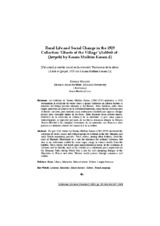Rural Life and Social Change in the 1929 Collection ‘Ghosts of the Village’ (Ashbah al-Qaryah) by Karam Mulhim Karam (I)
Vida rural y cambio social en la colección ‘Fantasmas de la aldea’ (Ašbāh al-Qaryah, 1929) de Karam Mulhim Karam (I)

Ver/
Autor
Walker, Dennis
Editor
Universidad de Córdoba, Servicio de PublicacionesFecha
2008Materia
CultureLebanon
Macro-history
French language
Maronites
Líbano
Cultura
Lengua francesa
Macro-historia
Maronitas
METS:
Mostrar el registro METSPREMIS:
Mostrar el registro PREMISMetadatos
Mostrar el registro completo del ítemResumen
The pre-1930 stories by Karam Mulhim Karam (1902-1959) document the evolution of varied classes and cultural groups in Lebanon in the late Ottoman, and early French mandatory, periods. These stories, among other features, show the roles of Maronite Christianity as a core for intactness for ordinary Lebanese, but also as an instrument crafted by some rogue clergy to extract wealth from the faithful. These stories did touch upon macro-historical issues of the evolution of Lebanon and its identity, such as the country as a continuous place, repression by the Ottoman Turks during World War I, and the self-corrupting linkages of the Maronites to France and other Western world powers through commerce and culture. Las historias de Karam Mulhim Karam (1902-1959) anteriores a 1930 documentan la evolución de varias clases y grupos culturales en Líbano durante el mandato del último periodo otomano y del francés. Estas historias, entre otros rasgos, muestran los papeles de la cristiandad maronita, como núcleo sin tacha para el libanés corriente, pero también como instrumento diseñado por algunos clérigos pícaros para conseguir dinero de los fieles. Estas historias tocan asuntos macrohistóricos de la evolución de Líbano y de su identidad: el país como espacio ininterrumpido, la represión por parte de los turcos otomanos durante la Primera Guerra Mundial y las corruptas conexiones de los maronitas con Francia y otros poderes occidentales a través del comercio y de la cultura.
